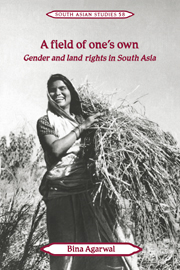Book contents
- Frontmatter
- Contents
- List of illustrations
- List of tables
- Preface
- Map 1.1 South Asia: provincial/state divisions
- 1 Land rights for women: making the case
- 2 Conceptualizing gender relations
- 3 Customary rights and associated practices
- 4 Erosion and disinheritance: traditionally matrilineal and bilateral communities
- 5 Contemporary laws: contestation and content
- 6 Whose share? Who claims? The gap between law and practice
- 7 Whose land? Who commands? The gap between ownership and control
- 8 Tracing cross-regional diversities
- 9 Struggles over resources, struggles over meanings
- 10 The long march ahead
- Definitions
- Glossary
- References
- Index
- Cambridge South Asian Studies
Preface
Published online by Cambridge University Press: 14 January 2010
- Frontmatter
- Contents
- List of illustrations
- List of tables
- Preface
- Map 1.1 South Asia: provincial/state divisions
- 1 Land rights for women: making the case
- 2 Conceptualizing gender relations
- 3 Customary rights and associated practices
- 4 Erosion and disinheritance: traditionally matrilineal and bilateral communities
- 5 Contemporary laws: contestation and content
- 6 Whose share? Who claims? The gap between law and practice
- 7 Whose land? Who commands? The gap between ownership and control
- 8 Tracing cross-regional diversities
- 9 Struggles over resources, struggles over meanings
- 10 The long march ahead
- Definitions
- Glossary
- References
- Index
- Cambridge South Asian Studies
Summary
This book has grown out of two long-standing involvements. One is my decade and a half of research on rural poverty, agrarian change, and the political economy of gender. The other is my association with the women's movement in South Asia, and my interaction over the years with peasant women from across the region, and with the few grassroots activists who were beginning to raise the issue of women's independent land rights within mass-based peasant movements in the late 1970s and early 1980s. Both my academic analysis and these interactions led me to investigate, and in that process recognize the central importance of women's lack of effective rights in property, especially land, in explaining their economic, social, and political subordination in South Asia. It became increasingly clear that it was critical for women to win those rights for establishing more equal gender relations, both within and outside the household. Indeed while the link between property and class relations has been well established in political economy, the link between property and gender relations has remained largely unexamined.
Land has been and continues to be the most significant form of property in rural South Asia. It is a critical determinant of economic well-being, social status, and political power. However, there is substantial evidence that economic resources in the hands of male household members often do not benefit female members in equal degree. Independent ownership of such resources, especially land, can thus be of crucial importance in promoting the well-being and empowerment of women.
- Type
- Chapter
- Information
- A Field of One's OwnGender and Land Rights in South Asia, pp. xv - xxiPublisher: Cambridge University PressPrint publication year: 1995

